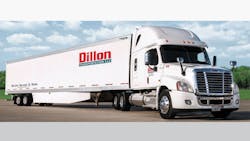Carrier requests split-sleeper flexibility for team drivers
Another fleet has asked the Federal Motor Carrier Safety Administration for some flexibility in the sleeper berth requirement so that team drivers “will experience better quality rest”—and be more safe. The request from Tennessee-based Dillon Transportation LLC, a 103-truck fleet with 50 team drivers, was published Friday in the Federal Register.
Dillon’s proposal is similar to those made my McKee Foods Transportation and CRST Expedited. FMCSA granted the McKee request in March 2015. Essentially, Dillon asks that its team drivers be allowed to take the equivalent of 10 consecutive hours off duty by splitting SB time into two periods totaling 10 hours, provided neither of the two periods is less than 3 hours. The drivers would be able to choose between either a 3/7, 4/6, or 5/5 “split” hour break to complete the required 10 hour-break.
In defending the request, Dillon notes that it recruits “only experienced, professional drivers,” and that it operates on a “routine weekly cycle” in which drivers are home weekly with 34-48 hours off. Additionally, Dillon's tractors are equipped with double-bunk sleepers in the event both drivers need or want to rest at the same time, and all of its tractors are equipped with electronic logging devices.
According to the petition, Dillon says it's “common knowledge” that sleeping in a moving vehicle is more difficult than for a single driver who is able to stop the truck during their sleeper time, and that having the flexibility to switch with a partner allows each driver to take advantage of shorter driver periods when they feel fatigued even though they have available driving time.
“This will result in a more flexible work pattern improving personal and vehicular safety,” the petition says.
In return, Dillon would take “countermeasures” to maintain safe operations. Along with electronic logs and speed limiters , Dillon team drivers’ drive time would be reduced from 11 hours to 10 hours.
In granting the McKee Foods request, FMCSA said “the agency is well aware that preventing fatigue is a complex process,” and the proposed controls “will ensure that safety is not adversely affected.” FMCSA also noted that split sleeper berth periods were allowed prior to 2003, so many roadside enforcement officers remain familiar with it, and training others can be done economically through existing methods.
In comments opposing the McKee Foods request, a representative of Advocates for Highway and Auto Safety argued that such an hours of service exemption “sets in motion a slippery slope … indicating the current HOS is not suitable for acquiring the needed rest.”
FMCSA has not ruled on the CSRT Expedited proposal, although the agency in December 2015 awarded a $2.5 million contract for researchers to study a safety provision that would allow truck drivers to split their required 10-hour sleeper berth time into shorter periods.
About the Author
Kevin Jones 1
Editor
Kevin has served as editor-in-chief of Trailer/Body Builders magazine since 2017—just the third editor in the magazine’s 60 years. He is also editorial director for Endeavor Business Media’s Commercial Vehicle group, which includes FleetOwner, Bulk Transporter, Refrigerated Transporter, American Trucker, and Fleet Maintenance magazines and websites.
